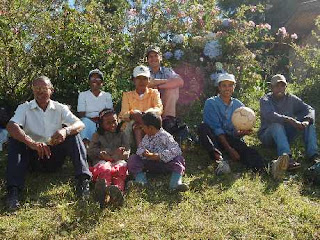I live in a small village on the plateau, within easy driving distance of Tana, by means of a nicely paved road (which is a rarity in this country); that is, once I walk the two kilometers to the bigger town next door.
The main income in town, aside from housing all of us volunteers, is rice farming, and the valley bottoms all around this hilly area are filled with paddies. On the hillsides, people farm other subsistence crops like manioc, carrots, potatoes, and taro. There are also several stores in town, rooms in the bottom floors of their mud brick homes, that sell candles, soap, toilet paper (the first kind I bought was more like sandpaper than tissue), bananas, dried fish, and assorted “Made in Mad” (or China) processed foods.
 I live with a family of 4, very small my Malagasy standards, and have a room to myself. Christin and Noeline are 32 and 28, respectively, and their girl, Ioni is 11 and Tslavina, their boy, is 7. There is no electricity or plumbing, even in this fairly wealthy area. Life is simple and nights are ling. I use a chamber pot at night and empty it into a latrine in the morning. It is not culturally appropriate for us to go out at night here, everyone is in doors after dark, which arrives at 6:
I live with a family of 4, very small my Malagasy standards, and have a room to myself. Christin and Noeline are 32 and 28, respectively, and their girl, Ioni is 11 and Tslavina, their boy, is 7. There is no electricity or plumbing, even in this fairly wealthy area. Life is simple and nights are ling. I use a chamber pot at night and empty it into a latrine in the morning. It is not culturally appropriate for us to go out at night here, everyone is in doors after dark, which arrives at 6:
My shower is a bucket with water heated in a pot, on a grate, over the wood fire that serves as a kitchen. It is certainly a challenge to learn how to cook over a fire. As for food, I eat rice 3 times a day and am actually fond of it! I’ve already come to the point where I don’t fell full unless I have rice, and a lot of it. In addition, I usually eat beans and carrot salad and bananas or pineapple for dessert (oh, the pineapple!) Some days though, we do eat pancakes or latkas for breakfast, though I think Peace Corps taught them how to cook those so that we don’t go crazy. And, thank Andriamanitra (or God), my family drinks coffee every morning (even the seven year old, though I have tried with my feeble language skills to warn against that).
“It’s hot outside.”
“Yes it is. I’m tired.”
“Me, too.”
“Bye.”
“Bye.”
“I went to the lake for the party and ate fried bananas.”
“I ate samosas.”
“Bye.”
“Bye.”



